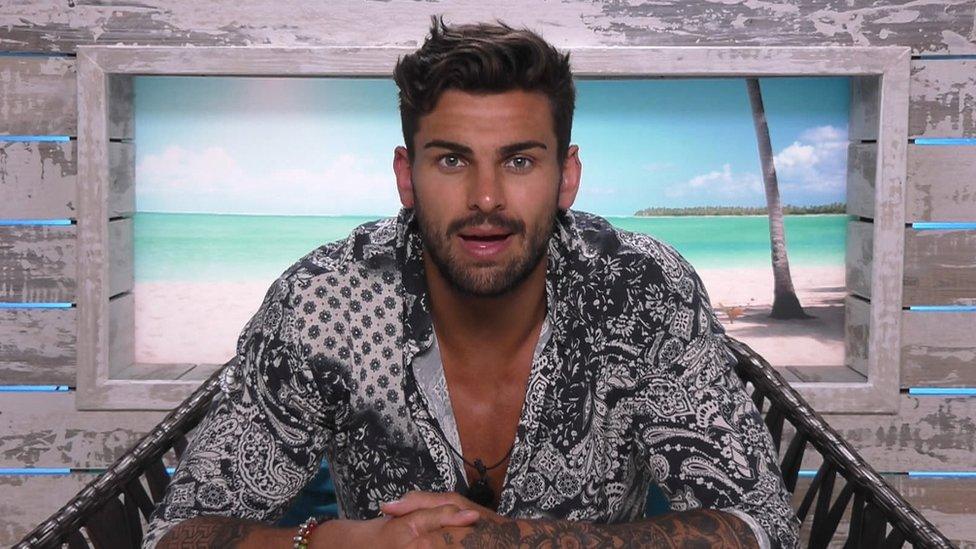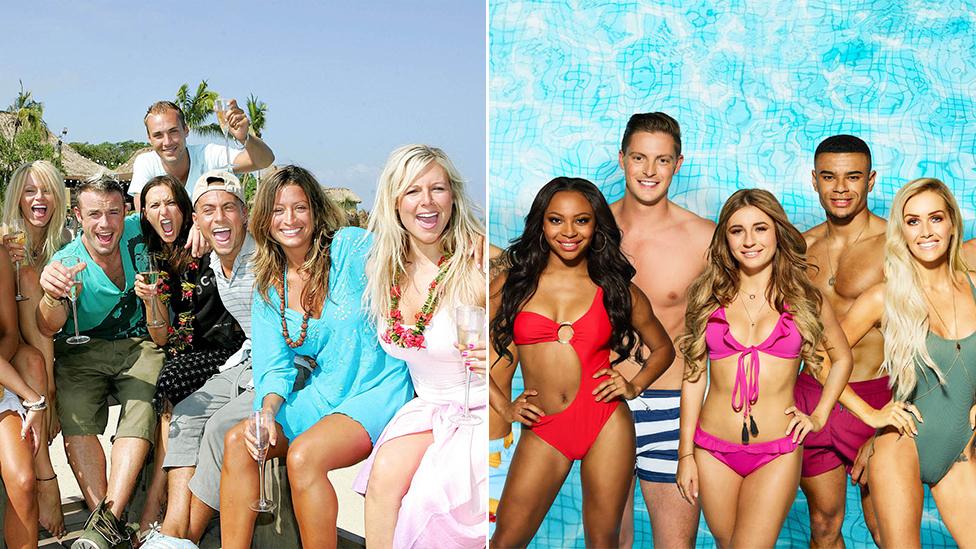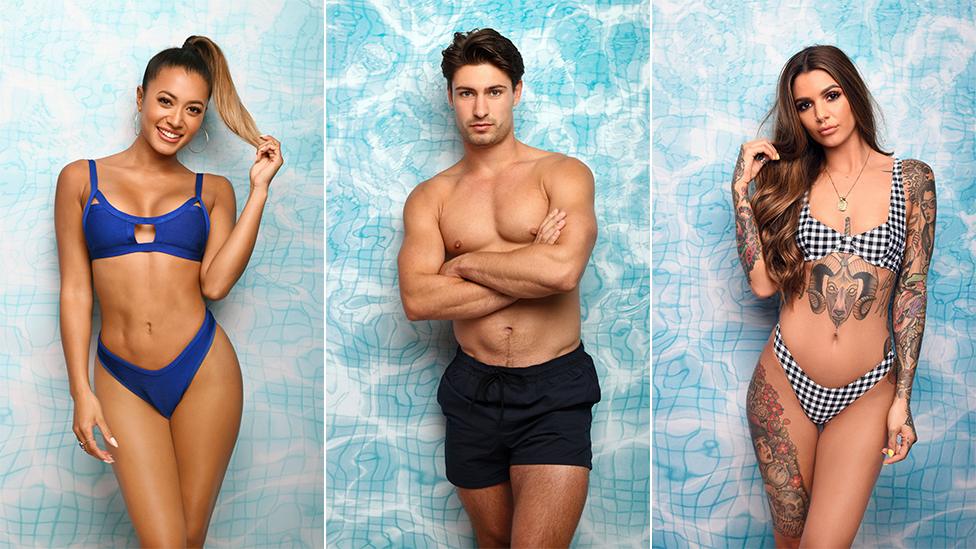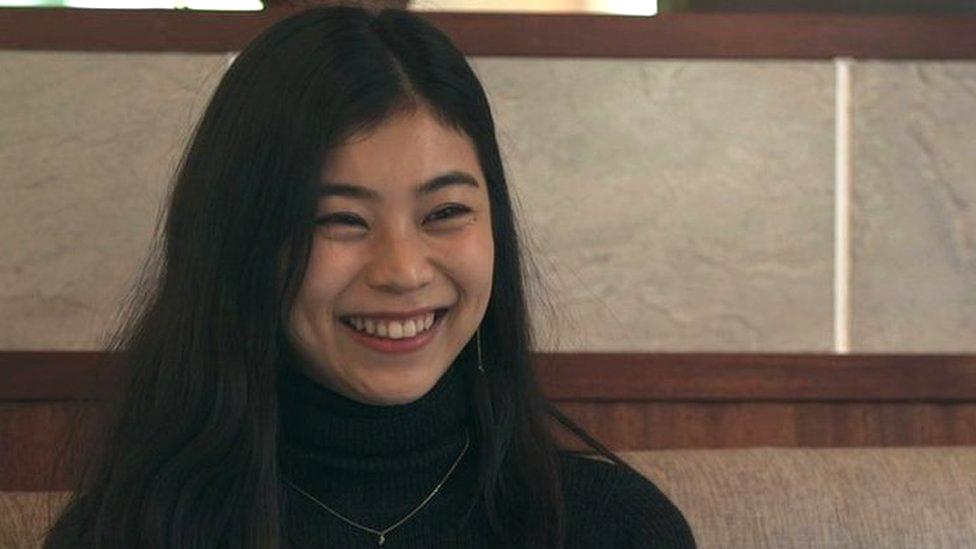Should Love Island surgery ads be banned?
- Published

The cast of Love Island 2018 includes models, beauty consultants and a doctor
The tanned, toned and scantily clad bodies of the contestants on Love Island are synonymous with the show.
It is hard to imagine another TV programme with so much swimwear (that doesn't involve racing) or with a dedicated section for watching people forced to get dressed up every night - sorry all, no PJs or joggers here.
But while some question the effect this has on viewers, the chief executive of NHS England worries it spreads even further to the advertisements around it.
Speaking to the BBC's Andrew Marr Show, Simon Stevens raised concerns about seeing trailers for cosmetic breast surgery during the ITV2 show.
He claimed the images were "playing into a set of pressures around body image", leading to young people needing mental health services.
He added: "The time has come to think long and hard about whether we should be exposing people to those kinds of pressures."
The British Association of Aesthetic Plastic Surgeons (BAAPS) has called for a full ban on advertising for plastic surgery.
But, in its absence, it has laid out the "minimum restrictions" it should have, including prohibiting all advertising clearly marketed at an under-18 audience, and stopping advertising in public places, such as TV adverts or billboards.
Former BAAPS president and plastic surgeon Douglas McGeorge said advertising such procedures during a show watched by "vulnerable" and "impressionable" people, namely those aged under 18, was "totally inappropriate".
He said it was "opportunistic" and that surgery was a medical procedure that "should not be treated as a commodity".
"Love Island is a bit of titillation and if it keeps people happy that's wonderful," he said.
"But to say that what viewers are seeing in the show is normal, and then show adverts selling aspirational services to achieve that norm is wrong."
'Heartbreaking stories'
One of the advertisers during the show is MYA Cosmetic Surgery, which offers breast enlargements, tummy tucks and other procedures.
A spokeswoman for the firm said: "We believe that our service makes a positive difference to people's lives.
"If you read some of the stories as to why patients have cosmetic surgery, you will better understand the role it plays. Some of the stories are truly heartbreaking and the surgery can be genuinely life changing," she said.
She said MYA carries out "a range of health and suitability checks" and only performs surgery on people over 18.
"The operating surgeon must believe that the patient has realistic expectations, that the procedure will make a positive long-term difference and that it has been very carefully considered," she said.
MYA said it has only aired its ads on the show's on-demand services with the aim of specifically targeting women aged 18-34. It said none of its ads were shown on TV.

Melissa Innes said her decision to have a breast enlargement was hers alone
While accepting that there is pressure on young people to "look perfect", the decision to have surgery is ultimately up to the individual, said Melissa Innes.
The 25-year-old from Harlow, Essex, said her decision to have a breast enlargement was hers alone.
"I don't blame MYA for that [pressure]," she said.
"From my experience they did nothing but empower me to make a decision that made me feel good about myself with no pressure."
The adverts, she said, merely gave her a good idea of where to look for help.
"I think TV adverts for cosmetic surgery are definitely a good thing as it makes you aware of the company," Ms Innes said.
She said the advert merely "led her to look into the company".

Contestants of the show often spend all day in swimwear
But psychology lecturer Sarah Riley, from the University of Aberystwyth, said society as a whole needs to address how much of a person's value it places on their looks.
"If as a society we send the message that people are valued for looking a particular way and we reduce the ability for people to be valued in other ways, then it will make sense for young people to work on their looks, and commercial organisations will then exploit this," she said.
"What this does, though, is expose people to risks associated with surgery and also to an ever-escalating concern around looks."
Dr Riley also said discussions need to be had about "how commercial interests exploit our desire to be valued".
An ITV spokeswoman said: "ITV takes its responsibility to viewers very seriously and ensures adverts broadcast during our programmes adhere to the UK Code of Broadcast Advertising's rules on the content and scheduling of advertising."
- Published9 July 2018

- Published11 June 2018

- Published28 June 2018

- Published5 June 2018

- Published29 June 2018
